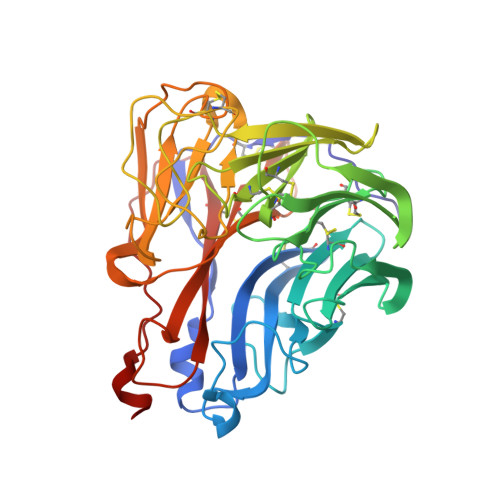Characterization of two distinct neuraminidases from avian-origin human-infecting H7N9 influenza viruses
Wu, Y., Bi, Y.H., Vavricka, C.J., Sun, X.M., Zhang, Y.F., Gao, F., Zhao, M., Xiao, H.X., Qin, C.F., He, J.H., Liu, W.J., Yan, J.H., Qi, J.X., Gao, G.F.(2013) Cell Res 23: 1347-1355
- PubMed: 24165891
- DOI: https://doi.org/10.1038/cr.2013.144
- Primary Citation of Related Structures:
4MWJ, 4MWL, 4MWQ, 4MWR, 4MWU, 4MWV, 4MWW, 4MWX, 4MWY, 4MX0 - PubMed Abstract:
An epidemic of an avian-origin H7N9 influenza virus has recently emerged in China, infecting 134 patients of which 45 have died. This is the first time that an influenza virus harboring an N9 serotype neuraminidase (NA) has been known to infect humans. H7N9 viruses are divergent and at least two distinct NAs and hemagglutinins (HAs) have been found, respectively, from clinical isolates. The prototypes of these viruses are A/Anhui/1/2013 and A/Shanghai/1/2013. NAs from these two viruses are distinct as the A/Shanghai/1/2013 NA has an R294K substitution that can confer NA inhibitor oseltamivir resistance. Oseltamivir is by far the most commonly used anti-influenza drug due to its potency and high bioavailability. In this study, we show that an R294K substitution results in multidrug resistance with extreme oseltamivir resistance (over 100 000-fold) using protein- and virus-based assays. To determine the molecular basis for the inhibitor resistance, we solved high-resolution crystal structures of NAs from A/Anhui/1/2013 N9 (R294-containing) and A/Shanghai/1/2013 N9 (K294-containing). R294K substitution results in an unfavorable E276 conformation for oseltamivir binding, and consequently loss of inhibitor carboxylate interactions, which compromises the binding of all classical NA ligands/inhibitors. Moreover, we found that R294K substitution results in reduced NA catalytic efficiency along with lower viral fitness. This helps to explain why K294 has predominantly been found in clinical cases of H7N9 infection under the selective pressure of oseltamivir treatment and not in the dominant human-infecting viruses. This implies that oseltamivir can still be efficiently used in the treatment of H7N9 infections.
Organizational Affiliation:
1] CAS Key Laboratory of Pathogenic Microbiology and Immunology, Institute of Microbiology, Chinese Academy of Sciences, Beijing 100101, China [2] University of Chinese Academy of Sciences, Beijing 100049, China.

















